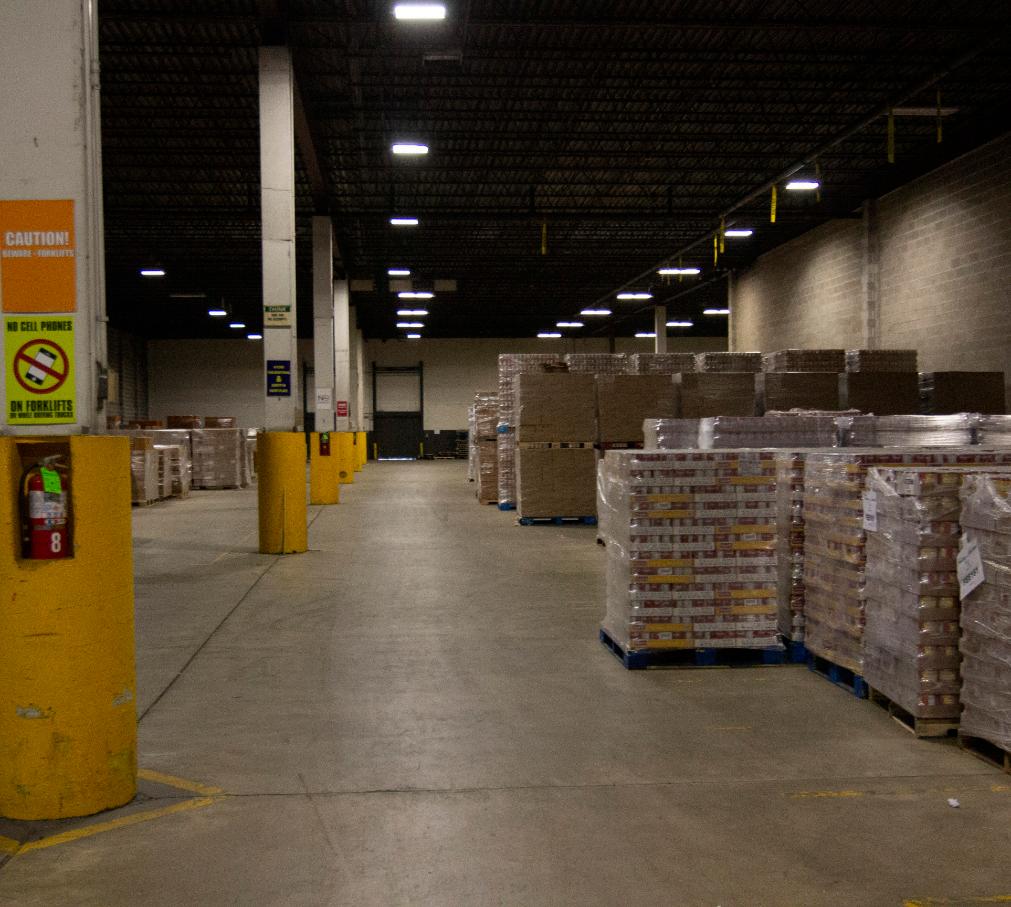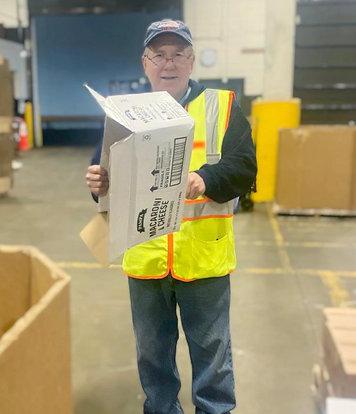




A 3-year project for 25,000 people on pathways out of poverty unHungry
My addiction, faith, and recovery have shaped the core principles of Small Things. When I got clean at 24, I was scared, confused, and lonely. The people who took the time to treat me with dignity and respect had the greatest impact on my new life. Their small things added up, giving me a solid foundation for lasting change and the motivation to pay it forward, working with the hardest hit people in the city find a pathway out of their despair.
When we started Small Things, I started with providing food, because pathways are harder when you’re hungry. Small Things is ready to more directly address deep poverty and addiction with a three-year, threeprong plan:

1. MEALSincreaseaccess to quality food in low-access ZIP codes, meeting people’s physical needs to build trust with them and within the community.
2. MARKETSincreasetrustof neighbors in key ZIP codes with free grocery stores we call Small Things Markets. This model dramatically increases the supply due to increased access to new food sources.
3. MOREthan(food)programsdecreasepovertyas Small Things becomes a trusted guide to job training, services, housing, and other pathways out of poverty.
An unHungry Life starts with a breathing space, a chance to focus on key steps out from poverty of the mind and body as we help meet people’s basic survival needs. If you have ever lived with labels like “addict,” “homeless,” or “poor,” you understand how they stick to you.
The unHungry Project is designed to actively and purposefully help more people know and do the small things that are right for them, just like heroes in my life did for me.
If you are reading this letter, chances are you took a step of faith and entrusted me and Small Things with money and counsel in our early days. With that trust and cash, we did what we said we were going to do. Because we kept our eye on the ball, we find ourselves at the beginning of the third part of my original plan earlier than I would have dreamed.
Please bring your whole self to these few pages. The city is waiting for us.

The Rev. Vito F. Baldini Founder and Executive Director, Small Things, Inc.

We can do no great things, only small things with great love.
**Small Things chooses not to feature the faces of our guests, unless granted permission

The U.S. Department of Agriculture defines “food insecure”¹ as lacking consistent access to affordable, healthy food.

In three years, overall foodinsecurity in the Philadelphia region grewfrom13.6%to 21.2%.
250,000people are considered food insecure in Philadelphia².

TheunHungryProject is our 3-year plan for 25,000 people to enter their pathway out of poverty and food insecurity.

Small Things is looking for 50Partners: institutions, families, and churches who committhreeyearsofconsistentfunding. This consistency is critical to the plan’s success.
1. The Philadelphia Tribune, May 18, 2024
2. The Philadelphia Inquirer, August 8, 2022
At the heart of Small Things is a complex and adaptable warehouse operation that consistently delivers customized food and dry goods orders from an ever-changing supply chain.
What makes this even more remarkable is how this gets done in rented space with a small army of volunteers. This start-up operation has been molded through hundreds of small adjustments into the oneofthelargestfoodaccesspoints in the region.
The unHungry Project will strengthen and greatly expand our core warehouse service, with seven strategies to move beyond food distribution and into direct, human service:
1
2
Double#ofMarkets in the lowest-access ZIP codes. Minimize costs with donated space owned by Small Things or provided free by a community partner.
(Operating Budget: $225,000 annually/Market; $775,000 for 3 years).
3
Recruitandretainkeyleadershippositions so Vito can operate in his strengths. (Key staff Budget: $200,000 annually; $600,000 for 3 years).
Doubledonatedfoodsupplyby expanding access to USDA’s The Emergency Food Assistance Program (TEFAP), whose chain-of-custody rules favor owned-Markets. (Compliance Budget: $70,000 annually; $210,000 for 3 years).
4 5
Innovatein-marketexperiences to maximize patron interaction and traffic, building trusted relationships with more people at a lower marginal cost.
(POS, layout changes, PT staff Budget: $75,000 annually; $225,000 for 3 years).
Overhaulwarehousinganddeliverysystemsto keep pace with increased hours, locations, and the restocking required to achieve this target. (W/H staff; Accounting/CRM systems Budget: $70,000 year 1, $40,000 year 2-3).


Develop“more than food”³ Reinventing Food Banks and Pantries: New Tools to End Hunger programs to build on the trust established by direct service Markets and open pathways out of poverty.
($40,000 annually; $120,000 3 years).
Quantifyimpactby developing unHungry Life metrics and using these to drive fundraising and marketing with hired and/or outsourced leadership.
(Metric development: $15,000; Outsource Budget: $40,000/yr.; $120,000 for 3 years).
TOTALPROJECTEDSERVICEIN HIGH-POVERTYZIPCODES
• 4,200 Guests/Market/Yearx6TotalMarkets=75,600Guestsover3years
• 33%ofGuestscreatepathway=25,175Totalpathways
• 6,750,000Totalmealsover3years

50 Project Partners at these levels generate 3 years of stable cash flow.
After three years, Small Things would be better positioned to secure increased city and state support, a key sustainability strategy. One-time investments provide greater operating efficiency.

Total3-yr.ProjectSupport$5,655,000
In2023,lessthan$1millionofoperatingincomeleveragedover$5million in donated food, supplies, and labor. This is an efficient organization with a bootstrap mindset.
TheunHungryProjectcandoubletheamountoffoodandopportunitiesto directlyconnectpeopletopathwaysoutofpoverty.
This increase comes from this: A direct service MARKET (vs. a partner pantry) qualifies for a much more reliable supply of food through TEFAP.
This USDA program requires a comprehensive “chain of custody” standard that we already meet in our established Markets. Meeting needs in lowaccess ZIP codes through Small Things Markets is the fastest and least expensive way to increase unHungry days in Philadelphia.
Small Things current operating budget is ~ $1 million per year. Fully funding the unHungry Project will require $5.65 million over three years. Start-up and other capital expenses will wind down starting in year three; we estimate an FY28 operating budget of ~$2M.
From this budget, Small Things can create specific sponsorship packages (e.g. a Market location).
Small Things can accommodate multi-year funding and gifts of appreciated stock.
Small Things is a registered 501(c)3; it conducts annual audits reviewed by its Board of Directors. IRS Form 990s are available on the organization’s website. Small Things’ EIN is 85-3741798.
Small Things actively seeks commercial real estate partnerships that provide optimal benefits for all parties.

When the layoffs in the printing industry came, Sean lost his job of twenty years; his life began a downward spiral. He turned towards alcohol even as his family and friends turned away from providing the help and support he needed. It didn’t matter that Sean grew up in, was confirmed by, and even served, in his church.
He went to a church school; those roots faltered when the hard times came.
Sean lost his home and became part of Center City’s unhoused community. He endured assaults, robberies, and threats. Eventually, he entered the Philadelphia shelter system and while there, learned about meals and assistance from Emmanuel, a ministry of a church just off Rittenhouse Square in Center City Philadelphia.

During his first visit, Emmanuel’s leader sat down with Sean and connected him to what he needed most. Presence. And a path. Small things, really.
The path that began at Emmanuel led Sean to become an integral part of the volunteer team and the church community. In time, as his trust and confidence grew, Emmanuel partners connected Sean to services designed to get him back on his feet and off the street. Again, small things in the moment. Giant leaps over time.
Together, they secured temporary housing and a place for Sean to keep his belongings, care for his personal hygiene, and to rediscover his spiritual roots. Off the street, Sean began to walk with the community at that church. He got his life back, moved into a place of his own, achieved sobriety and found work. Sean now plays a vital role in helping others get on their paths through his work with Small Things and as a Deacon for the church where it all began.
When Sean was young, his mother pronounced his name “seen,” not “shawn.” He adopted the conventional version when he entered the shelter system. Today, though, Sean is now SEEN, a profound statement of someone whose past life includes time among the unseen peopling our streets.
In 2023’s budget, less than $1 million of operating income leveraged over $5 million in donated food, supplies, and labor. Now, we express that vision in 3 (Small) Things We Do:

Meals are where Small Things started in 2020. Today, this core competency has been extended to three programs; all our operations are supported by the three core processes of this first strategy.
1.PantryPartners– In the early days of Small Things in a global pandemic, Small Things quickly became a primary source of food for local pantries. Today, we consistently maintain ~50 outlets across the Philadelphia region. In this model, we function mostly like our largest providers of food, Philabundance and Feeding America. Approximately 80% of our total food is given to small, often church-run, neighborhood outlets.
2.EasterOutreach–The annual Easter Outreach campaign, the original springboard for Small Things, Outreach was spearheaded by Vito from his staff/pastor position in a Center City church. Every Easter he would organize dozens of churches and hundreds of volunteers to assemble tons of food and fan out across the city at Easter time. This network kick-started Small Things when people were plunged into poverty overnight*.
3.Children’sHealthySnacks–In partnership with Aetna, we source, assemble, and provide healthy snack bags to school-age children across the city, as funding permits. The kits also include ageappropriate health and nutrition information*.
* Denotes a significant use of volunteer labor.
1.Warehouse Operations deliver the right food and supplies to the right location while minimizing waste and spoilage*.
2.Sourcing Operations secure food and goods from approximately 15 providers for everything from fresh produce to shelf-stable products. Most food is donated, but some is purchased to fill gaps in supply*.
3.DeliveryOperations combine drop-off and pickup services from and at the warehouse. These go on throughout the week.
Small Things’ core competency is managing a complex, fluid set of inputs (rescued produce and retail goods) and producing efficiently packed, customized, and delivered shipments for its own Markets and pantry partners.
* Supported by volunteer labor.
Since launching in 2020, Small Things has delivered enough food for 16.9million meals or for 46,347people to have a meal every day for a year.
Of course, research shows that for most people, outlets like ours are supplemental sources, especially for fresh and healthy options. Few if any people source all their meals from a single source.

Small Things Markets are open in three locations. Two additional sites are under review.
1.SmallThingsFairhillMarket – is in the heart of the Kensington neighborhood. This prototype site taught us how to structure additional sites to grow with the lowest possible fixed costs. It started being open one day a week and has quickly grown to three since its launch Nov 2023.*
2.SmallThingsCenterCity –(aka Emanuel) is a Saturday hot meal service for our neighbors with no fixed address. This prepared, served meal is a popular volunteer activity for local businesses, schools, and churches; In Fall of 2023, we opened a pantry offering dry goods here.*
3.TheSmallThingsHuntingParkMarket –provides meals and kids snacks for a summer football camp (Timoteo Sports) attended by 200+ children. This site is in collaboration with a local church and is supported by a three-year funding commitment from the Zack and Julie Ertz Foundation and ACME Albertsons. In Fall of 2024, Small Things will begin providing the hot meal preparation in addition to self-service shopping.
4.Forfuturelocations –Small Things is in the process of evaluating ZIP code level needs.
* Supported by volunteer labor.

Likethewarehouse,eachMarket operationhasbeenrefinedtooptimize choiceforeachshopper.
A simplified point system minimizes waiting and is a key part of serving with dignity. Long wait times are a major side-effect of poverty and take a toll not just in time, but in self-image. Being seen as worthy of good service is a critical step in building trust and legitimacy for those living on thin margins.
Small Things’ central idea is that food is just the beginning, and we aren’t meant to stay at the beginning of a client’s journey, to only bring food. We are called to “more than…”
There are three things necessary to go the “last mile,” to sustain the person:
1.Volunteers – There are hundreds of people doing small things with great love. It’s how change happens, especially when relationships are formed with people who previously did not see themselves as neighbors.
2.JobTraining– Fork-lift certification equips the unemployed to get their credentials for free and enables them to find work in logistics and distribution hubs. One of the largest of these hubs on the East coast is being developed in the Bellwether District on the site of the former refinery near the Philadelphia airport. Here, 19,000 permanent jobs are expected to be created with the first building already under construction.

3.PathwayServices –There is no single pathway. No “one-size-fits-all” approach that can “scale up” and “transform the city.” There is only and ever one thing that helps people move from stuck to unstuck, from hungry to unHungry: Small acts of love, done in relationship, over time.
When we started Small Things, we had no idea how to get the right food to the right places and people at the right time. But we figured it out, and now we can deliver healthy, balanced food to low-access areas across the city.
The work around Pathways to sufficiency revolves around one word: Access.
First,Markets provide access to neighbors, and with that the opportunity and responsibility to build trust.
Second, those locations give the neighbors a single access point to scattered support systems spread across different parts of the city and institutions, both public and private.
Third, and most importantly is access to relationships built around small things, small acts, over time. While we won’t follow the city’s model of hiring hundreds of people to navigate complex systems, but we will keep them busy!
We know that unresolved trauma is a giant obstacle to growth and health. We are actively exploring partnerships with traditional, small-group models and an experimental AI-aided trauma recovery methodology.

The unHungry Pathway is classic human development in four stages: trust, plan, act, repeat. Whether on the scale of a non-profit working on behalf of its donors, or at the level of Small Things and its shoppers, the Pathway can lead to life-changing, cycle-breaking transformations.

The Small Things Pathway proposes a way to move beyond meeting the basic needs of individuals to help them reach their potential.


SmallThings’RepeatableProcess
Small Things is a consistent partner (to people) in high-poverty ZIP codes, earning trust through dignified access to appropriate food in local Markets, and opening pathways to an unHungry life.
Each phrase is unpacked below:
Small Things is a consistent partner…
Social change requires a persistent presence; that presence requires Small Things Markets.
…(to people) in high-poverty ZIP codes…
Food and service “deserts” result in residents stuck in a doom loop that contributes to generational poverty and despair; Kensington is a special focus area.
…earning trust…
Trust takes time, presence, confidence that because you’ve been around for a good length of time you really care and will be around for whatever comes next.
…through dignified access…
We make a virtue out of how both people and the physical plant combine to create a sense of honor, dignity, and safety.
..to appropriate food…
A best practice is to provide culturally appropriate food as a key element of respect and dignity.
…in local Markets…
This direct service model differentiates Small Things from other non-profit food distribution agencies and is an essential element in support of the prior commitments of consistency, trust, and dignity. Often, this model requires ownership or other forms of ensuring a low-cost, high-impact, durable presence.
One option to be explored are tax-advantaged strategies for businesses who sell buildings to a 501(c)3 for a tax loss. And because success in a neighborhood often leads to redevelopment, equity shared with the community could bring sale revenue shared by the community.
…and opening pathways…
Consistent presence opens the door to provide linkage to other agencies and services; keeping in mind “unHungry Life” as an outcome provides focus to those linkages. Some services (e.g., Small Things’ Forklift Certification project) would be directly provisioned.
…to an unHungry life.
These are very specific, person-focused outcome targets to be developed as part of the plan (see Appendix for more on the four-step model “Trust, Plan, Act, Repeat”).
Collaboration





We believe that partnership is critical to alleviating poverty, which is why we strive to build real, lasting relationships by collaborating with our partner organizations to meet the needs of their communities.
Dignity
We believe that every individual we support deserves to be treated with respect, empathy, and love regardless of their situation.
Integrity
We believe in having integrity in all of our actions and in all of our partnerships.
Impact
In everything we do, we want to ensure that our efforts have a positive impact in our community.
We believe in moving toward people, not away regardless of circumstances. Compassion is at the forefront of decision making.
Small Things is researching best practices and key milestones that work on an individual and community level. Our draft model is based on accepted human motivation research, and contains four steps which form a cycle of change, of small things added up. Those steps are:
1. TRUST positive change is possible,
2. PLAN a specific future position on the pathway (the next thing to do),
3. ACT by moving toward that point.
4. REPEAT
This is the engine of life change. This is how small things add up.
